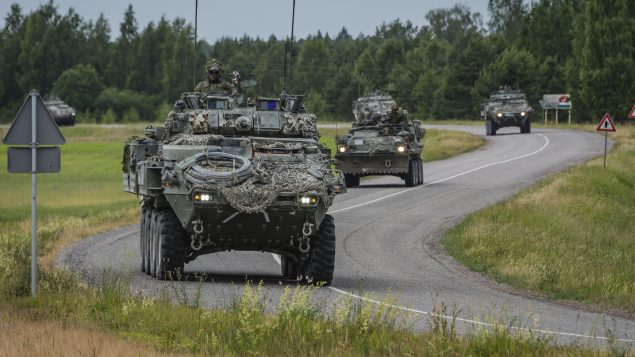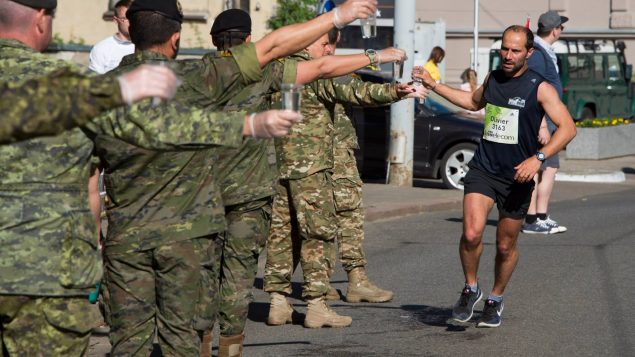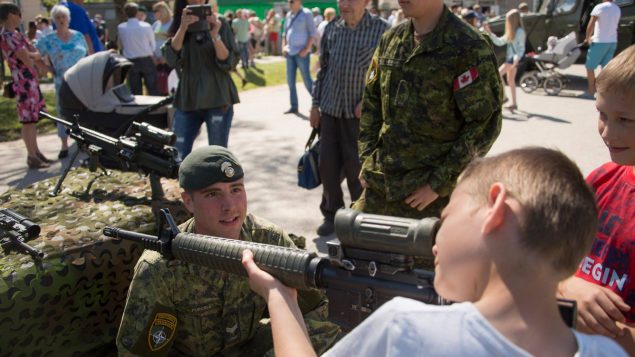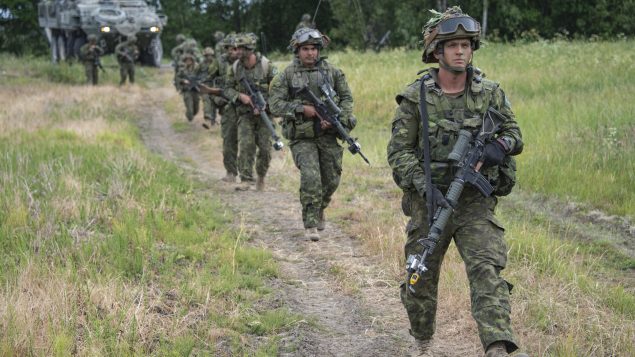As the Canadian military marks the one year anniversary of assuming command of a multinational force in Latvia designed to reassure the tiny Baltic country facing a newly assertive Russia, Canadian soldiers say they have learned important lessons in building a cohesive fighting force and countering Russian propaganda.
The Canadian-led enhanced Forward Presence (eFP) Battle Group Latvia is part of a much larger NATO force stationed on Russia’s western doorstep in neighbouring Estonia, Lithuania and Poland to serve as a deterrent force to make sure that Moscow does not attempt to repeat the Ukrainian scenario there.
“We’re here to deter and defend if necessary,” said Lt.-Col. Sean French, commanding officer of the battle group. “Ultimately we’re here to prevent any conflict and to make sure that the region is stable and it stays that way.”
(click to listen to the interview with Lt.-Col. Sean French)
ListenStrength in diversity

The enhanced Forward Presence Battle Group Latvia, take part of the Exercise SABER STRIKE 2018, near Skrunda, Latvia on June 11, 2018.
(Cpl Jean-Roch Chabot/ eFP BG LATVIA Public Affairs)
The 1150-strong battle group includes approximately 450 Canadian Armed Forces soldiers, as well as troops from Albania, Czech Republic, Italy, Poland, Slovakia, Slovenia, and Spain. The battle group is based at Camp Ādaži, near the Latvian capital of Riga.
The Canadians have been doing a lot of integration training to make sure troops understand each other’s procedures and ways of doing things, as well as being able to communicate with each other, said French, who commands the 2nd Battalion, The Royal Canadian Regiment (2 RCR), based in Gagetown, New Brunswick.
“But we’ve also been doing some more advanced training,” French said. “We’ve leveraged some American helicopters that are located with us here in Latvia [and] we’ve done some urban operations training.”
Outreach programs

Soldiers from the enhanced Forward Presence Battle Group Latvia hand out water to thirsty runners during the Lattelecom Riga Marathon 2018 on May 20, 2018. (Cpl. Jean-Roch Chabot/eFP BG Latvia Public Affairs)
Canadian soldiers also do a lot of outreach to build relations with the local population and counter the anti-NATO Russian propaganda, said French, who has served on peacekeeping missions in Bosnia, the Democratic Republic of Congo, as well as with Canadian troops in Afghanistan.
“Last week we were at a tractor pull,” French said. “We had some large military vehicles there with some weapons and some soldiers having some great interactions with Latvians.”
Canadians also ran one of the water stands at the Riga Marathon this year with uniformed soldiers from seven different nations handing out water to runners as they ran the grueling race, he said.
Countering Russian propaganda

A Canadian soldier from the enhanced Forward Presence Battle Group Latvia supervises a child manipulating a C-7 assault rifle during a vehicle and an equipment display held at the ‘Skrundas svētki’ festival at Skrunda, Latvia on May 12, 2018. (Cpl. Jean-Roch Chabot/eFP BG Latvia Public Affairs)
Latvia, a member of the European Union and NATO, has a sizeable Russian-speaking minority that has been the target of propaganda efforts by the Kremlin aimed at sowing distrust of the alliance and presenting it as a threat to regional stability and peace.
Many of the Russian-speaking Latvian citizens feel alienated by the efforts of successive governments to enforce the use and the primacy of the Latvian language in programs similar to those in Quebec.
Russian propaganda efforts also focus on Latvia’s controversial efforts to politically rehabilitate and whitewash Latvian Nazi collaborators during Second World War, including veterans of the Latvian Legion, which was a formation of Germany’s Waffen SS system.
Moscow in turn feels increasingly threatened by what it considers Western encroachment not only in its traditional spheres of influence such as Ukraine and the Baltics but the positioning of NATO military forces on its very borders.
Camp Ādaži, for example, is only about 260 kilometres from the city of Pskov in western Russia.
French said Canadian soldiers took the opportunity of an air mobile exercise near the southeastern city of Daugavpils, Latvia’s second largest city, near the border with Belarus, to interact with the local Russian-speaking population.
“Obviously there has been some hesitation but we hadn’t seen any big issues with any of the population, including the Russian population,” French said.
“There are some concerns because of Latvian politics in terms of language laws but it’s not something we’re unfamiliar with in Canada.”
In the meantime the Canadians are getting ready for a rotation of forces, as 2 RCR will be replaced by 1 RCR out of Petawawa, Ontario, in mid-July, French said.







For reasons beyond our control, and for an undetermined period of time, our comment section is now closed. However, our social networks remain open to your contributions.